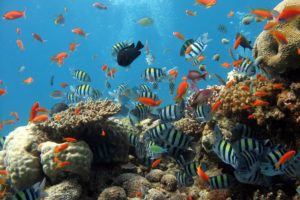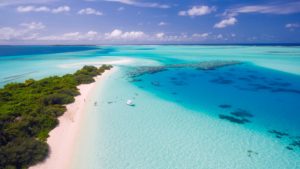Coral reefs are dying, marine life is threatened, and your sunscreen could be the cause or the savior. As chemicals continue to flood our oceans, it’s up to big and small businesses to lead consumers down a sustainable path that will save our oceans.
Whether you’re lucky enough to live by the ocean or are currently planning your next beach vacation, it’s crucial to make sure that you’re not carrying this dangerous item in your beach bag. Thrown in with your sunglasses and snacks, the sunscreen that protects your skin may be posing a serious threat to coral reefs and ocean life. Studies have found that over 3,500 popular main brand sunscreens, such as Coppertone, Hawaiian Tropic, and Banana Boat, contain the chemicals oxybenzone and octinoxate, which are meant to protect from UV rays, but are ultimately causing severe damage to coral reefs. According to National Geographic, an estimated 14,000 tons of sunscreen enter our oceans each year, the vast majority of which contain these chemicals.
Impact in and out of the water

Have you ever noticed a white haze in the water while snorkeling? That’s probably from the cumulation of sunscreen. However, the most harmful effects are the ones that you don’t see. A study of the effects of oxybenzone found that when it enters the water it actively kills coral and damages and deforms DNA in early and late stage coral, preventing development. Oxybenzone and octinoxate can also cause coral bleaching, which is one of the main threats to coral reefs throughout the world. As coral is damaged and reef mortality rises, ecosystems are disrupted and fish and other ocean life are put in danger. John Fauth, a scientist specializing in coral reefs, stated that, “coral reefs are the world’s most productive marine ecosystems and support commercial and recreational fisheries,” making them an invaluable resource. Coral reefs also promote the tourism industry, and increase employment and income for many regions of the world, including developing countries. In addition, they “protect coastlines from storm surge,” providing some defense against cyclones, hurricanes, and typhoons. We need coral reefs, and something as simple as our sunscreen could eradicate them.

On May 1, 2018, the state of Hawaii passed a bill banning the sale of sunscreen containing oxybenzone and octinoxate. This groundbreaking bill goes into effect in 2021, but local communities and businesses are already working to spread awareness and promote safe sunscreen alternatives. While sunscreen endangers all coral reefs, it is especially harmful in areas with large tourist populations such as Hawaii, Florida, the Caribbean, and Australia. Hawaii is making big strides towards sustainability with the first bill in the United States to ban these chemicals, and other areas of the world are working to meet these new standards from the ground up. Starting with small and local businesses, an increasing number of stores and resorts are encouraging the use of reef-friendly sunscreen through sustainable sales and advertising. More and more policies are being created to protect the coral reefs as well, as other areas move towards a widespread ban such as Hawaii’s. In Cozumel, Mexico, there is a federal regulation enforcing the use of only reef-friendly, biodegradable sunscreen in many major marine parks. With plastic filling our oceans and climate change already posing a huge threat to coral reefs, it is vital that we do our part and stop polluting the ocean with dangerous chemicals from our sunscreen. As official regulations move forward slowly, businesses have the power to start saving coral reefs now by providing sustainable products to an ever-growing number of conscious consumers.
What can you do?
Thankfully, there is a simple solution: buy “reef-friendly” sunscreen! These sunscreens use minerals such as zinc oxide and titanium dioxide to keep both your skin and the ocean safe. Next time you’re picking up some sunscreen, be sure to check the list of ingredients for these minerals and look for a “non-nano” label, which ensures no coral absorption.
Reef-Friendly Sunscreens:
- Tropic Sport
- Raw Elements
- All Good
- Babo Botanicals
- Badger
- Stream2Sea
- Goddess Garden Organics
- Mama Kuleana
- Kokua Sun Care
- Manda Organic
- Raw Love
- Thinksport
- Suntegrity
- TotLogic
Studies also recommend that scuba divers “wear rash guards or scuba wetsuits and skip all the hygienic products” when diving to help keep oceans clean. In addition, cover-ups, hats, and umbrellas can be used to help stay out of the sun, and decrease sunscreen use.
How does this impact the sunscreen industry?

The new sunscreen ban in Hawaii spurred locals, medical professionals, resorts, and even airlines, to come together in support of the bill. According to Travel and Leisure, “Aqua-Aston Hospitality, Hawaii’s largest chain of hotels and resorts, is teaming up with eco-friendly, mineral-based sunscreen Raw Elements to provide visitors with a safe (and free) alternative.” Years before the bill takes effect in 2021, Hawaiian businesses are already shifting their sunscreen sales towards sustainability with the promotion of reef-friendly products. New sunscreen companies are showing a clear trend towards sustainability to align with such a growing demand. However, it’s not just small businesses that are making an impact.
As environmental awareness grows, more and more people are demanding sustainable, eco-friendly products, forcing an overall shift in business practices. It is no longer business as usual. We see this in action as REI, a massive world–renowned retailer of outdoor goods, has recently set in place new sustainability standards for their products. REI is making huge strides as they will no longer be selling sunscreens containing oxybenzone by 2020. This sustainable code of conduct greatly appeals to the conscious consumer, and solidifies REI’s reputation as an eco-friendly retailer. In the release of this news, REI CEO Jerry Stritzke stated, “We’re collaborating with partners across industries to advance sustainable business practices, and as a result are completely changing the conversation around sustainability for the U.S. outdoor industry.” As big companies raise the bar for sustainable business practices, others are forced to follow suit in order to compete with a growing demand for sustainable products.
Consumers have the power to enact large-scale change and encourage sustainable business practices, and we’re seeing that in action today. Buying reef-friendly sunscreen not only protects our coral reefs and ocean life, but supports sustainable businesses and steers more companies towards an eco-friendly path.
Written by: Katie Cohen
References:
Downs, C. A., Kramarsky-Winter, E., Segal, R., Fauth, J., Knutson, S., Bronstein, O., . . . Loya, Y. (2015, October 20). Toxicopathological Effects of the Sunscreen UV Filter, Oxybenzone (Benzophenone-3), on Coral Planulae and Cultured Primary Cells and Its Environmental Contamination in Hawaii and the U.S. Virgin Islands. Retrieved from https://link.springer.com/article/10.1007/s00244-015-0227-7
Fleetham, D. (2018, May 03). Here Are Some Alternatives to Reef-Damaging Sunscreen. Retrieved from https://www.nationalgeographic.com/travel/features/sunscreen-destroying-coral-reefs-alternatives-travel-spd/
Glusac, E. (2018, May 03). Hawaii Passes Bill Banning Sunscreen That Can Harm Coral Reefs. Retrieved from https://www.nytimes.com/2018/05/03/travel/hawaii-sunscreen-ban.html
Haereticus Environmental Labratory. (n.d.). Octinoxate. Retrieved from http://www.haereticus-lab.org/octinoxate/
Isla Cozumel. (2018, March 28). 2018, the International Year of Coral Reefs (2nd part). Retrieved from http://cozumel.travel/en/2018/03/28/2018-the-year-to-save-the-coral-reefs-2/
Kotala, Z. (2015, October 20). Lathering Up with Sunscreen May Protect Against Cancer – Killing Coral Reefs Worldwide. Retrieved from https://today.ucf.edu/lathering-up-with-sunscreen-may-protect-against-cancer-killing-coral-reefs-worldwide/
Leasca, S. (2017, August 14). Hawaiian Hotels Are Giving Away Free Eco-friendly Sunscreen to Save the Reefs. Retrieved from https://www.travelandleisure.com/trip-ideas/yoga-wellness/aqua-aston-hospitality-hawaii-free-sunscreen
Miller, K. (2018, May 04). Every Sunscreen You Own Might Be Banned In The State Of Hawaii Soon. Retrieved from https://www.womenshealthmag.com/beauty/a20154659/reef-safe-sunscreen/
REI. (2018, April 9). REI Co-op introduces new standards to raise bar on sustainability across outdoor and retail industries. Retrieved from https://newsroom.rei.com/news/corporate/rei-co-op-introduces-new-standards-to-raise-bar-on-sustainability-across-outdoor-and-retail-industries.htm
Romo, V. (2018, May 02). Hawaii Approves Bill Banning Sunscreen Believed To Kill Coral Reefs. Retrieved from https://www.npr.org/sections/thetwo-way/2018/05/02/607765760/hawaii-approves-bill-banning-sunscreen-believed-to-kill-coral-reefs
Rose, K. (2018, May 03). Your Reef Safe Sunscreen Guide – 12 Sunscreens that are Reef Safe. Retrieved from https://www.hawaii.com/blog/reef-safe-sunscreen/
Zhekova, D. (2018, April 22). How to Know if Your Sunscreen Is Killing Coral Reefs – and 12 Brands to Try Instead. Retrieved from https://www.travelandleisure.com/style/beauty/reef-safe-sunscreen







